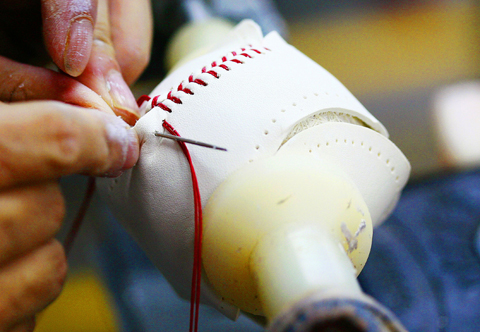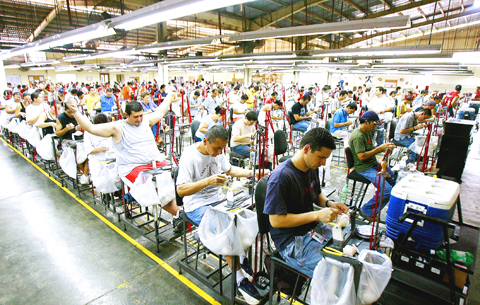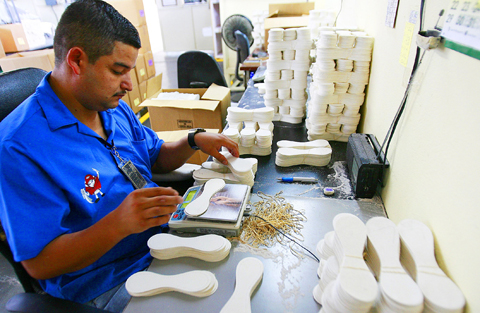The average baseball is only used for a few pitches in the US Major Leagues, but for the Costa Ricans who make them, each ball is the result of hours of painstaking stitching by hand.
For 10 hours a day, workers at the world’s only factory authorized to supply Major League Baseball, in the town of Turrialba in central Costa Rica, sit at desks yanking strands of waxy red fiber to form each baseball’s 108 stitches.
In professional games the balls quickly become too dirty and scuffed by bats to use, or get lost in the crowd on a foul ball or home run. To feed the demand, the factory turns out as many as 2.4 million baseballs a year, all assembled by hand.

PHOTO: REUTERS
The cork and rubber cores, Tennessee Holstein cowhide and gray New Zealand sheep’s wool yarn are shipped tax-free to the plant where more than 300 workers sit in neat rows to sew, their arms rhythmically rising and falling like a rowing team.
The finished balls are boxed up and shipped to Miami.
Famed for its stability in a turbulent region, Costa Rica is an economic success story in Central America, earning money from eco-tourism, coffee and fruit exports, and factories making everything from making microchips to pharmaceuticals.

PHOTO: REUTERS
Manufacturer Rawlings Sporting Goods, which has an exclusive contract to supply Major League Baseball until 2013, moved its factory here from Haiti in the late 1980s, fleeing the violent aftermath of a dictatorship in the Caribbean nation.
The workers are glad for the pay in a depressed farming town with few other jobs, but few show much interest in baseball in a country that is much more passionate about soccer.
“I really don’t understand baseball,” said Minor Quesada, who has worked at the factory for 17 years.

PHOTO: REUTERS
The work is tough and some employees have shoulder injuries from trying to churn out too many balls to win bonuses.
They earn a base salary of US$1.60 an hour, slightly above Costa Rica’s minimum wage but a world away from the US$3 million average salary of a US professional baseball player.
Still, for many in Turrialba it’s a good deal.
“It’s pretty hard to find work,” said Rocio Gamboa, 33, who has been stitching baseballs at the factory for 11 years.
She produces 200 balls a week, and receives a US$0.52 bonus for each ball she completes above the 156-ball minimum. The major league balls are sold at retail for US$14.99.

DAREDEVIL: Honnold said it had always been a dream of his to climb Taipei 101, while a Netflix producer said the skyscraper was ‘a real icon of this country’ US climber Alex Honnold yesterday took on Taiwan’s tallest building, becoming the first person to scale Taipei 101 without a rope, harness or safety net. Hundreds of spectators gathered at the base of the 101-story skyscraper to watch Honnold, 40, embark on his daredevil feat, which was also broadcast live on Netflix. Dressed in a red T-shirt and yellow custom-made climbing shoes, Honnold swiftly moved up the southeast face of the glass and steel building. At one point, he stepped onto a platform midway up to wave down at fans and onlookers who were taking photos. People watching from inside

MAKING WAVES: China’s maritime militia could become a nontraditional threat in war, clogging up shipping lanes to prevent US or Japanese intervention, a report said About 1,900 Chinese ships flying flags of convenience and fishing vessels that participated in China’s military exercises around Taiwan last month and in January last year have been listed for monitoring, Coast Guard Administration (CGA) Deputy Director-General Hsieh Ching-chin (謝慶欽) said yesterday. Following amendments to the Commercial Port Act (商港法) and the Law of Ships (船舶法) last month, the CGA can designate possible berthing areas or deny ports of call for vessels suspected of loitering around areas where undersea cables can be accessed, Oceans Affairs Council Minister Kuan Bi-ling (管碧玲) said. The list of suspected ships, originally 300, had risen to about

A Vietnamese migrant worker yesterday won NT$12 million (US$379,627) on a Lunar New Year scratch card in Kaohsiung as part of Taiwan Lottery Co’s (台灣彩券) “NT$12 Million Grand Fortune” (1200萬大吉利) game. The man was the first top-prize winner of the new game launched on Jan. 6 to mark the Lunar New Year. Three Vietnamese migrant workers visited a Taiwan Lottery shop on Xinyue Street in Kaohsiung’s Gangshan District (崗山), a store representative said. The player bought multiple tickets and, after winning nothing, held the final lottery ticket in one hand and rubbed the store’s statue of the Maitreya Buddha’s belly with the other,

Japan’s strategic alliance with the US would collapse if Tokyo were to turn away from a conflict in Taiwan, Japanese Prime Minister Sanae Takaichi said yesterday, but distanced herself from previous comments that suggested a possible military response in such an event. Takaichi expressed her latest views on a nationally broadcast TV program late on Monday, where an opposition party leader criticized her for igniting tensions with China with the earlier remarks. Ties between Japan and China have sunk to the worst level in years after Takaichi said in November that a hypothetical Chinese attack on Taiwan could bring about a Japanese